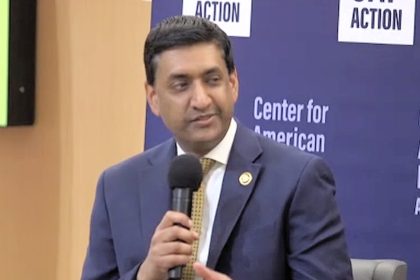Report Says Female Entrepreneurs in Middle East Could Boost Economy

WASHINGTON — Given increased economic stress around the world, the official release of a new report by the Wilson Center’s Middle East Program on female entrepreneurship in the MENA region may be that much more relevant.
The Middle East and North Africa region has one of the lowest levels of women’s labor force participation, averaging at 19% — compared with the global average of 46% — and only one in four businesses is owned by women. The Wilson Center’s study, which included data from the entire region but focused particularly on case studies in Bahrain, Lebanon and Tunisia, looked to identify why gender gaps in entrepreneurship persist and make suggestions to close some barriers for female-owned businesses.
Translating women’s desire for entrepreneurship into reality in the MENA region has substantial potential to boost productivity and income according to Katrina Fotovat, senior official at the State Department’s Office of Global Women’s Issues, at an event for the report’s release.
“Gender equality is intrinsically linked with the well-being of all society. … A critical part of [that] is promoting entrepreneurship,” she said.
Fotovat suggested that the State Department was placing women’s economic security at the heart of American foreign policy, already working in the MENA region on training, capacity building, digital and financial tools, and improved access to markets and supply chains.
Women’s business in MENA is “good for the entire economy,” she said, as it “could add up to $6 trillion for the global economy.”
Similarly, Sheik Abdullah bin Rashid al Khalifa, Bahrain’s ambassador to the United States, said that “women’s advancement has long been on the forefront of [Bahrain’s] priorities.” To this end, his country has established a Supreme Council for Women, spearheaded by Princess Sabeeka Bint Ibrahim Al Khalifa.
“Recognition of the participation of women raises the standard of every aspect of our lives,” he said, calling the report a “powerful document.”
But despite the efforts many MENA countries are working toward to open entrepreneurship and career opportunities, assure physical and mental well-being, and promote financial self-sufficiency, there remain legal barriers and “cultural norms … [that] make it challenging for women to access services outside of their communities or make them vulnerable to harassment,” explained Lynn Mounzer, analyst and co-author of “Women and Entrepreneurship in the MENA Region.“
The report, which aggregates datasets from various national, regional, and global sources and is supplemented by interviews with those affected, hopes to better explain why women’s entrepreneurship in the MENA region continues to lag behind.
“We tried to expand the view of social, economic and leadership barriers women faced,” Mounzer said.
A variety of challenges are identified, including education and workforce skills readiness, a legal environment in MENA that hinders female entrepreneurship in subtle and not-so-subtle ways, social-cultural mindsets, a lack of accessibility to safe and affordable travel, and a venture capital funding gap.
“Less than 3% of the VC money in the region went to women in 2022,” Mounzer said, adding, “[Women] face an uphill battle when pitching their ideas to male-oriented panels.”
And those who are able to secure funding to start a business have a hard time getting the money to grow and sustain that business.
While women and men in Lebanon, Tunisia and Bahrain technically have the same rights to open bank accounts and obtain credit at formal financial institutions — Bahrain is the only country in the region to enforce open banking — in the MENA region, less than 5% of the land is owned by women, and women face discriminatory inheritance laws that make asset ownership rare, hindering them from securing loans without collateral.
“Gaining relevant experience in fields where women wish to establish their business is also challenging,” Mounzer said.
Among other reforms, she and her co-authors push for improving financial inclusion to adopt gender-sensitive lending practices, targeted investment in women’s skills training, legal efforts to address discriminatory laws, and, overall, creating an enabling environment to address the discrimination women are facing.
“We need to work towards improving the economic condition of women in the region whether in the workforce … or as entrepreneurs,” Mounzer insisted. “You’re missing out on a huge population … if you’re not giving them support.”
“To improve your economy, improve business, and even improve the social condition in your country, it’s common sense,” she said. “[Women] are a great power and we cannot forget that, as we tend to do.”
Kate can be reached at [email protected]























